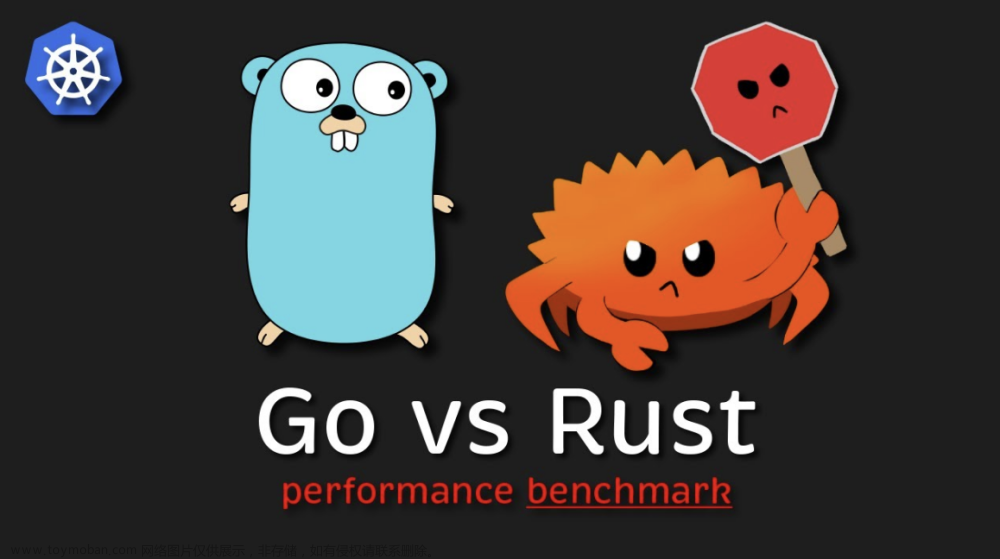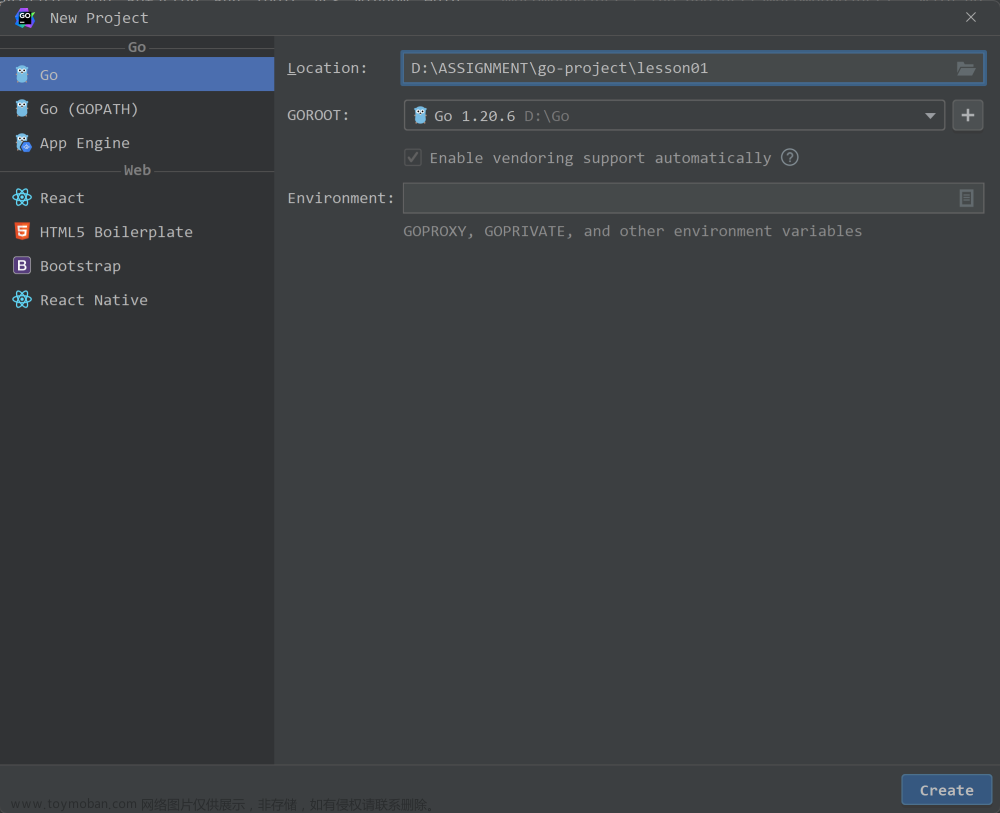
题图来自 Go vs. Rust: The Ultimate Performance Battle
241. Yield priority to other threads
Explicitly decrease the priority of the current process, so that other execution threads have a better chance to execute now. Then resume normal execution and call function busywork.
将优先权让给其他线程
package main
import (
"fmt"
"runtime"
"time"
)
func main() {
go fmt.Println("aaa")
go fmt.Println("bbb")
go fmt.Println("ccc")
go fmt.Println("ddd")
go fmt.Println("eee")
runtime.Gosched()
busywork()
time.Sleep(100 * time.Millisecond)
}
func busywork() {
fmt.Println("main")
}
After Gosched, the execution of the current goroutine resumes automatically.
aaa
eee
ccc
bbb
ddd
main
::std::thread::yield_now();
busywork();
242. Iterate over a set
Call a function f on each element e of a set x.
迭代一个集合
package main
import "fmt"
type T string
func main() {
// declare a Set (implemented as a map)
x := make(map[T]bool)
// add some elements
x["A"] = true
x["B"] = true
x["B"] = true
x["C"] = true
x["D"] = true
// remove an element
delete(x, "C")
for e := range x {
f(e)
}
}
func f(e T) {
fmt.Printf("contains element %v \n", e)
}
contains element A
contains element B
contains element D
use std::collections::HashSet;
fn main() {
let mut x = HashSet::new();
x.insert("a");
x.insert("b");
for item in &x {
f(item);
}
}
fn f(s: &&str) {
println!("Element {}", s);
}
x is a HashSet
Element a
Element b
243. Print list
Print the contents of list a on the standard output.
打印 list
package main
import (
"fmt"
)
func main() {
{
a := []int{11, 22, 33}
fmt.Println(a)
}
{
a := []string{"aa", "bb"}
fmt.Println(a)
}
{
type Person struct {
First string
Last string
}
x := Person{
First: "Jane",
Last: "Doe",
}
y := Person{
First: "John",
Last: "Doe",
}
a := []Person{x, y}
fmt.Println(a)
}
{
x, y := 11, 22
a := []*int{&x, &y}
fmt.Println(a)
}
}
[11 22 33]
[aa bb]
[{Jane Doe} {John Doe}]
[0xc000018080 0xc000018088]
fn main() {
let a = [11, 22, 33];
println!("{:?}", a);
}
[11, 22, 33]
244. Print map
Print the contents of map m to the standard output: keys and values.
打印 map
package main
import (
"fmt"
)
func main() {
{
m := map[string]int{
"eleven": 11,
"twenty-two": 22,
}
fmt.Println(m)
}
{
x, y := 7, 8
m := map[string]*int{
"seven": &x,
"eight": &y,
}
fmt.Println(m)
}
}
map[eleven:11 twenty-two:22]
map[eight:0xc000100040 seven:0xc000100028]
use std::collections::HashMap;
fn main() {
let mut m = HashMap::new();
m.insert("Áron".to_string(), 23);
m.insert("Béla".to_string(), 35);
println!("{:?}", m);
}
{"Béla": 35, "Áron": 23}
245. Print value of custom type
Print the value of object x having custom type T, for log or debug.
打印自定义类型的值
package main
import (
"fmt"
)
// T represents a tank. It doesn't implement fmt.Stringer.
type T struct {
name string
weight int
firePower int
}
// Person implement fmt.Stringer.
type Person struct {
FirstName string
LastName string
YearOfBirth int
}
func (p Person) String() string {
return fmt.Sprintf("%s %s, born %d", p.FirstName, p.LastName, p.YearOfBirth)
}
func main() {
{
x := T{
name: "myTank",
weight: 100,
firePower: 90,
}
fmt.Println(x)
}
{
x := Person{
FirstName: "John",
LastName: "Doe",
YearOfBirth: 1958,
}
fmt.Println(x)
}
}
Will be more relevant if T implements fmt.Stringer
{myTank 100 90}
John Doe, born 1958
#[derive(Debug)]
// T represents a tank
struct T<'a> {
name: &'a str,
weight: &'a i32,
fire_power: &'a i32,
}
fn main() {
let x = T {
name: "mytank",
weight: &100,
fire_power: &90,
};
println!("{:?}", x);
}
Implement fmt::Debug or fmt::Display for T
T { name: "mytank", weight: 100, fire_power: 90 }
246. Count distinct elements
Set c to the number of distinct elements in list items.
计算不同的元素的数量
package main
import (
"fmt"
)
func main() {
type T string
items := []T{"a", "b", "b", "aaa", "c", "a", "d"}
fmt.Println("items has", len(items), "elements")
distinct := make(map[T]bool)
for _, v := range items {
distinct[v] = true
}
c := len(distinct)
fmt.Println("items has", c, "distinct elements")
}
items has 7 elements
items has 5 distinct elements
use itertools::Itertools;
fn main() {
let items = vec!["víz", "árvíz", "víz", "víz", "ár", "árvíz"];
let c = items.iter().unique().count();
println!("{}", c);
}
3
247. Filter list in-place
Remove all the elements from list x that don't satisfy the predicate p, without allocating a new list.
Keep all the elements that do satisfy p.
For languages that don't have mutable lists, refer to idiom #57 instead.
就地筛选列表
package main
import "fmt"
type T int
func main() {
x := []T{1, 2, 3, 4, 5, 6, 7, 8, 9, 10}
p := func(t T) bool { return t%2 == 0 }
j := 0
for i, v := range x {
if p(v) {
x[j] = x[i]
j++
}
}
x = x[:j]
fmt.Println(x)
}
[2 4 6 8 10]
or
package main
import "fmt"
type T int
func main() {
var x []*T
for _, v := range []T{1, 2, 3, 4, 5, 6, 7, 8, 9, 10} {
t := new(T)
*t = v
x = append(x, t)
}
p := func(t *T) bool { return *t%2 == 0 }
j := 0
for i, v := range x {
if p(v) {
x[j] = x[i]
j++
}
}
for k := j; k < len(x); k++ {
x[k] = nil
}
x = x[:j]
for _, pt := range x {
fmt.Print(*pt, " ")
}
}
2 4 6 8 10
fn p(t: i32) -> bool {
t % 2 == 0
}
fn main() {
let mut x = vec![1, 2, 3, 4, 5, 6, 7, 8, 9, 10];
let mut j = 0;
for i in 0..x.len() {
if p(x[i]) {
x[j] = x[i];
j += 1;
}
}
x.truncate(j);
println!("{:?}", x);
}
[2, 4, 6, 8, 10]
or
fn p(t: &i64) -> bool {
t % 2 == 0
}
fn main() {
let mut x: Vec<i64> = vec![1, 2, 3, 4, 5, 6, 7, 8, 9, 10];
x.retain(p);
println!("{:?}", x);
}
[2, 4, 6, 8, 10]
249. Declare and assign multiple variables
Define variables a, b and c in a concise way. Explain if they need to have the same type.
声明并分配多个变量
package main
import (
"fmt"
)
func main() {
// a, b and c don't need to have the same type.
a, b, c := 42, "hello", 5.0
fmt.Println(a, b, c)
fmt.Printf("%T %T %T \n", a, b, c)
}
42 hello 5
int string float64
fn main() {
// a, b and c don't need to have the same type.
let (a, b, c) = (42, "hello", 5.0);
println!("{} {} {}", a, b, c);
}
42 hello 5
251. Parse binary digits
Extract integer value i from its binary string representation s (in radix 2) E.g. "1101" -> 13
解析二进制数字
package main
import (
"fmt"
"reflect"
"strconv"
)
func main() {
s := "1101"
fmt.Println("s is", reflect.TypeOf(s), s)
i, err := strconv.ParseInt(s, 2, 0)
if err != nil {
panic(err)
}
fmt.Println("i is", reflect.TypeOf(i), i)
}
s is string 1101
i is int64 13
fn main() {
let s = "1101"; // binary digits
let i = i32::from_str_radix(s, 2).expect("Not a binary number!");
println!("{}", i);
}
13
252. Conditional assignment
Assign to variable x the value "a" if calling the function condition returns true, or the value "b" otherwise.
条件赋值
package main
import (
"fmt"
)
func main() {
var x string
if condition() {
x = "a"
} else {
x = "b"
}
fmt.Println(x)
}
func condition() bool {
return "Socrates" == "dog"
}
b
x = if condition() { "a" } else { "b" };
258. Convert list of strings to list of integers
Convert the string values from list a into a list of integers b.
将字符串列表转换为整数列表
package main
import (
"fmt"
"strconv"
)
func main() {
a := []string{"11", "22", "33"}
b := make([]int, len(a))
var err error
for i, s := range a {
b[i], err = strconv.Atoi(s)
if err != nil {
panic(err)
}
}
fmt.Println(b)
}
[11 22 33]
fn main() {
let a: Vec<&str> = vec!["11", "-22", "33"];
let b: Vec<i64> = a.iter().map(|x| x.parse::<i64>().unwrap()).collect();
println!("{:?}", b);
}
[11, -22, 33]
259. Split on several separators
Build list parts consisting of substrings of input string s, separated by any of the characters ',' (comma), '-' (dash), '_' (underscore).
在几个分隔符上拆分
package main
import (
"fmt"
"regexp"
)
func main() {
s := "2021-03-11,linux_amd64"
re := regexp.MustCompile("[,\\-_]")
parts := re.Split(s, -1)
fmt.Printf("%q", parts)
}
["2021" "03" "11" "linux" "amd64"]
fn main() {
let s = "2021-03-11,linux_amd64";
let parts: Vec<_> = s.split(&[',', '-', '_'][..]).collect();
println!("{:?}", parts);
}
["2021", "03", "11", "linux", "amd64"]
266. Repeating string
Assign to string s the value of string v, repeated n times and write it out.
E.g. v="abc", n=5 ⇒ s="abcabcabcabcabc"
重复字符串
package main
import (
"fmt"
"strings"
)
func main() {
v := "abc"
n := 5
s := strings.Repeat(v, n)
fmt.Println(s)
}
abcabcabcabcabc
fn main() {
let v = "abc";
let n = 5;
let s = v.repeat(n);
println!("{}", s);
}
abcabcabcabcabc文章来源:https://www.toymoban.com/news/detail-608521.html
本文由 mdnice 多平台发布文章来源地址https://www.toymoban.com/news/detail-608521.html
到了这里,关于Rust vs Go:常用语法对比(十三)的文章就介绍完了。如果您还想了解更多内容,请在右上角搜索TOY模板网以前的文章或继续浏览下面的相关文章,希望大家以后多多支持TOY模板网!














